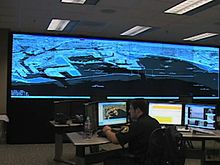Long Beach Harbor Patrol
Harbor Patrol

The Long Beach Harbor Patrol is a highly trained, fully armed security force with the Port.[1][better source needed] Classified as Public Officers by the City of Long Beach. Long Beach Harbor Patrol Officers are empowered to enforce provisions of the Long Beach Port Tariff and certain vehicle and penal codes,they provide a necessary and vital connection to real time events in the Harbor. The (LBHP) Long Beach Harbor Patrol works in partnership with the LBPD's Port Police Division[2][better source needed] to protect the Port.
Within the Port jurisdiction, the Harbor Patrol maintains a high-visibility patrol and responds to a wide variety of calls. These include, but are not limited to: Emergency, non-emergency crimes, traffic accidents, explosions, HazMat, terrorism and industrial accidents. The Harbor Patrol also ensures that terminals are compliant with United States Coast Guard security requirements.
The Harbor Patrol provides a wide variety of services above and beyond land-based patrol, including its own boat, commercial dive team, and officers specializing in physical security and technical surveillance systems.
History

The Long Beach Harbor Patrol was established on December 17, 2001 following the terrorist attack of September 11, 2001. The Port of Long Beach, being the second largest port in the United States makes this port essential to the US economy. The port requires 24-hour, 7-day-per-week enforcement whether that may be on land, sea, or air.[3]
Principles
Safety and security are the main priorities for the Port of Long Beach. With the attacks of September 11, 2001, the port and various government agencies have reacted proactively to ensure that security is addressed adequately and efficiently to protect the port. Long Beach Harbor patrol take pride in the role of developing strategies to mitigate security risks. Harbor Patrol works closely with both public and private agencies to plan and coordinate security measures.[4]
Port Security
The port uses different sources of law enforcement to keep the port safe which include Homeland Security, Long Beach Police Department, and the Port Security Unit. Unlike the Los Angeles County's coastal patrol; which operate under Sheriff's Department and LAPD harbor division, Long Beach Harbor Patrol have their own police.[5]
| Department | Responsibilities |
|---|---|
| Long Beach Police Department (LBPD) | Responsible for law enforcement at the Port of Long Beach and city property adjacent to the facility. The LBPD “port security unit” patrols the harbor by boat and typically deploys one to five officers in the port area. |
| Port of Long Beach Harbor Patrol | Responsible for security at the Port of Long Beach. Non-sworn Special Security Officers have limited law enforcement authority. |
| Long Beach Fire Department (LBFD) | Responsible for fire suppression and emergency medical response at the Port of Long Beach. |
| Department | Responsibilities |
|---|---|
| U.S Coast Guard (USCG) | Responsible for all security and response that occurs on the water surrounding the Ports of Los Angeles and Long Beach. Coordinates the Port Security Committee. |
| U.S Customs Service | Responsible for the inspection of cargo entering the port complex. |
| Immigration and Naturalization Service (INS) | Responsible for all people arriving on ships at the port complex. Ensures that visas are current and all entrants are legal. |
| Federal Bureau of Investigation (FBI) | Responsible for evidence collection and crime scene investigation in the event of an attack on the port complex. |
| Central Intelligence Agency (CIA | These agencies do not sit on the Port Security Committee, but are informally consulted. |
Duties


The duties involved include working closely with homeland security and United States Coast Guard. The main priority is keep the port safe from land, sea and air. The Long Beach Harbor Patrol is always looking to bring in individuals interested in careers in homeland security.
Other duties include the enforcement of sections of the California Penal and Vehicle Codes, the Long Beach Municipal Code and the Port of Long Beach Tariff/Ordinances; investigate and apprehend or detain persons suspected of illegal activity.[7]
- Monitor all vessels and train movement
- Monitor public and commercial traffic
- Construct traffic controls
- Construct vessel smoke emissions
- Inquire and completes emission enforcement reports
- Respond to request for services such as:
- disturbance
- crime calls
- traffic accidents
- hazmat occurrences
- medical aid request
- public safety incidents
- Act as a boat crewman to assist with special vessel operations
- Impound private owned vehicles
- Perform drayage and wharfage follow-up
- Generate appropriate logs, reports and notifications
- Monitor closed-circuit television (CCTV) systems
- Perform access control duties
- Operate screening technology
- Interact with Port Tenants
- Commercial trade visitors
- government agencies
- general public
See also
References
- ^ "Port of Long Beach".
{{cite web}}: Cite has empty unknown parameter:|dead-url=(help) - ^ "Long Beach Police Department".
{{cite web}}: Cite has empty unknown parameter:|dead-url=(help) - ^ "Port Police Division".
{{cite web}}: Cite has empty unknown parameter:|dead-url=(help) - ^ "Port Security".
{{cite web}}: Cite has empty unknown parameter:|dead-url=(help) - ^ Pasco, J. O (27 June 2006). "Who will pay for harbor patrols?". Los Angeles Times.
- ^ Zagart, Hipp, Jacobs, Amy B, Matthew C, Seth K (2005-01-01). "Port Security: Improving Emergency Response Capabilities at the Ports of Los Angeles and Long Beach". https://cloudfront.escholarship.org/dist/prd/content/qt5db5h9tv/qt5db5h9tv.pdf: 185, 190 & 195.
{{cite journal}}: External link in|journal= - ^ "Harbor Department - Port of Long Beach".
{{cite web}}: Cite has empty unknown parameter:|dead-url=(help)
External links
